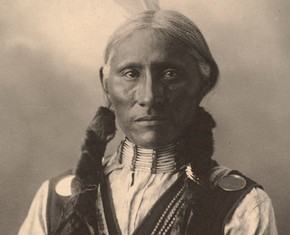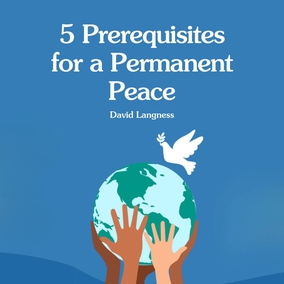The views expressed in our content reflect individual perspectives and do not represent the authoritative views of the Baha'i Faith.
Principal among the educators of humankind are the messengers and prophets of God, whose words and actions are expressly designed to instruct us.
Later in this series of essays we will discuss in detail some of the methods by which they instruct us, but here we should note some of the special characteristics that render them particularly effective in bringing about human enlightenment.
For one thing, since the prophet is not merely an enlightened human being, but a divine emissary sent explicitly to instruct us, he has a power, a capacity, a spiritual insight that enables him to discern precisely what lessons and methodologies would be particularly effective for humankind for a particular period in our development. In this context, Baha’u’llah compares the messenger—the manifestation of God—to a wise and capable physician:
The All-Knowing Physician hath His finger on the pulse of mankind. He perceiveth the disease, and prescribeth, in His unerring wisdom, the remedy. Every age hath its own problem, and every soul its particular aspiration. The remedy the world needeth in its present-day afflictions can never be the same as that which a subsequent age may require. Be anxiously concerned with the needs of the age ye live in, and center your deliberations on its exigencies and requirements. – Baha’u’llah, Gleanings from the Writings of Baha’u’llah, p. 213.
Therefore, while we as ordinary human beings assume our beginning at conception when the soul associates with the body, the messenger of God pre-exists in the spiritual realm, where he perceives the needs of humankind before willingly assuming a human persona wherewith he can deliver divine guidance in a manner we can understand.
Where we must acquire learning, the manifestation possesses innate knowledge. Here we are not referring to knowledge of the revelation itself, which begins at a particular point in the life of a prophet which we have come to associate with some outward sign, such as Moses’ seeing the burning bush, Buddha’s experience under the Bo tree, Christ’s baptism in the Jordan, Muhammad’s visions in the desert, the Bab’s vision of the Imam Husayn, and Baha’u’llah’s vision in the Black Pit of Tehran. Well before they begin their ministries, even during childhood, the prophets demonstrate that they possess a knowledge they have not acquired from any earthly source. In effect, their education is acquired before birth into this physical reality.
One and all, the messengers and prophets exhibit exemplary character. Inasmuch as each perfectly manifests the attributes of God, each becomes tantamount to the expression of Godliness in human terms. They are not God, nor are they of the same essence as God. Yet, as a perfect mirror reflects the heat and light of the sun without becoming the sun, so the manifestations demonstrate to us God’s nature in dramatic expression and through inherent powers without ever becoming God incarnate.
Therefore Christ could say to Philip, “He who has seen me has seen the Father” without in any sense implying that he was God in the flesh. To clarify his point, Christ explains in the same conversation: “The words that I say to you I do not speak on my own authority; but the Father who dwells in me does his works.”
Christ’s response also leads us to the focal point of how God utilizes His messengers are for our instruction—the process of revelation itself. For while ordinary human beings have the capacity to manifest the attributes of God and even to become divinely inspired, some to an extremely high degree, the prophets are uniquely endowed with the mission of becoming a channel through which God’s guidance for a particular period in history is revealed directly to humankind.
Abdu’l-Baha explains this capacity in part when he says that the manifestations possess a “universal divine mind” which “embraces existing realities” and “receives the light of the mysteries of God.” Abdu’l-Baha states that this power, unlike our own intellectual power, is not a product of “investigation and research” but is “a conscious power” unique to the prophets:
The spiritual power associated with the world of nature is the power of investigation, and it is through investigation that it discovers the realities and properties of things. But the heavenly intellectual power, which is beyond nature, encompasses, knows, and comprehends all things; is aware of the divine mysteries, truths and inner meanings; and discovers the hidden verities of the Kingdom. This divine intellectual power is confined to the holy Manifestations and the Daysprings of prophethood. A ray of this light falls upon the mirrors of the hearts of the righteous, that they may also receive, through the holy Manifestations, a share and benefit of this power. – Abdu’l-Baha, Some Answered Questions, newly revised version, p. 251.
We can attribute great influence and capacity to certain spiritualized human beings who appear throughout history, but powerful as they may be, these inspired souls operate under the influence and auspices of God’s messengers, reflecting the light of knowledge released by their revelations, even though we may presently be unable to detect any direct tie or apparent relationship.
The manifestations thus have untold influence. It would not be an exaggeration to say that human history is organized around their appearances or that human history proceeds according to this divine dynamic—and yet each of those prophets forthrightly attributes every action he takes and every word he utters to God acting through him, not to his own invention.
For example, according to scripture, God instructed Moses what to do and assured Him that God would provide the words: “And you shall speak to him [Aaron] and put the words in his mouth; and I will be with your mouth and with his mouth, and will teach you what you shall do.” Likewise, in explaining the authority of His words, Christ stated, “For I have not spoken on my own authority; the Father who sent me has himself given me commandment what to say and what to speak.” In the Qur’an Muhammad states that he cannot adapt or change the Qur’an to accommodate the desires of his followers because he is the channel through which God speaks to them and not the author of the words: “But when our clear signs are recited to them, they who look not forward to meet Us, say, ‘Bring a different Koran from this, or make some change in it.’ Say: It is not for me to change it as mine own soul prompteth. I follow only what is revealed to me ….”
















Comments
Sign in or create an account
Continue with Googleor